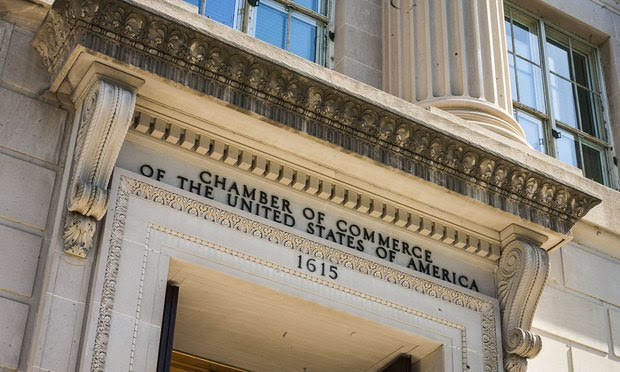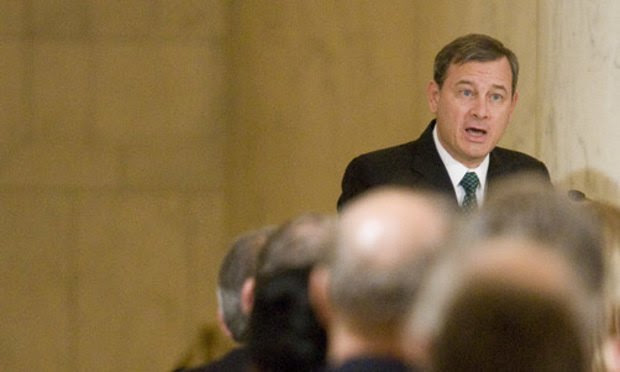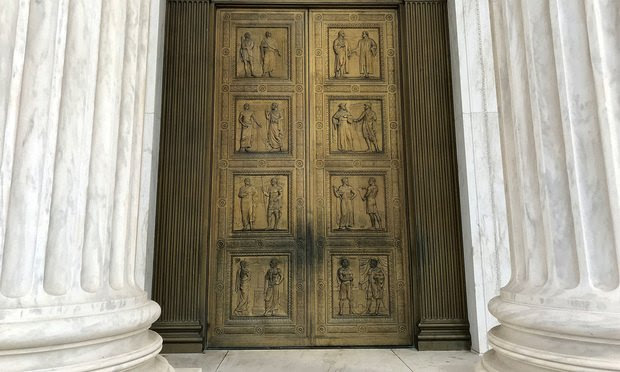The Art of the Deal, John Roberts Style | Will Arbitration Truck Along? | Plus: Kate Shaw Q&A
The justices have an insatiable appetite for arbitration. Meanwhile, check out Chief Justice Roberts displaying his skills at trying to find common ground on the eight-justice court. This is Supreme Court Brief—and thanks for reading!
October 03, 2018 at 07:00 AM
6 minute read
As the fate of the Supreme Court nomination of Brett Kavanaugh appears headed to its denouement, the justices soldier on. With two days of arguments wrapped up, the court's new term is firmly launched. We take a look this morning at the justices' insatiable appetite for arbitration in a case involving a trucker and the Federal Arbitration Act's “exemption 1.” Meanwhile, at a Tuesday oral argument, Chief Justice Roberts displayed his skill in finding narrow common ground in a way that may avoid a 4-4 tie in a difficult capital punishment case. Thanks for following Supreme Court Brief, where comments are welcomed at [email protected] and [email protected].

Parsing an Arbitration Exemption
If anyone doubts that arbitration cases continue to be a hot area of interest for the justices, take a look at this term and the last 30 years. The high court has had a steady diet of arbitration challenges with a majority of justices exhibiting a pro-arbitration bent.
This morning, the justices delve into one of three arbitration cases this term. New Prime Inc. v. Oliveira raises two questions that were issues of first impression in the U.S. Court of Appeals for the First Circuit and are of major significance to the transportation industry in general, and truckers in particular.
And like many arbitration fights, this one pits business and industry against workers, unions and consumer groups.
Dominic Oliveira, considered an independent contractor by New Prime, sued the company in a putative class action in Massachusetts federal district court. He alleged the company failed to pay minimum wages under the federal Fair Labor Standards Act and also claimed breach of contract. New Prime moved to compel arbitration. Oliveira opposed the motion, arguing that his contract was exempt under the Federal Arbitration Act's “contract of employment” exemption.
The FAA exemption applies to “contracts of employment of seamen, railroad employees, or any other class of workers engaged in foreign or interstate commerce.”
New Prime, represented by Theodore Boutrous of Gibson, Dunn & Crutcher, contends the exemption does not apply to independent contractor agreements. Oliveira's counsel, Jennifer Bennett of Public Justice, counters that when the FAA was enacted, the ordinary meaning of “contracts of employment” included independent contractor agreements.
The justices agreed to decide whether the dispute over the application of the exemption must be resolved in arbitration, and whether the exemption applies to independent contractor agreements.
>> Lining up in support of New Prime is the U.S. Chamber of Commerce, represented by Mayer Brown's Andrew Pincus. In his amicus brief, Pincus argues that the First Circuit decision for Oliveira is “wrong under the plain text” of the exemption and under the context in which Congress enacted the FAA. He warns a decision for Oliveira would undermine “an entire industry's reliance on the national policy favoring arbitration.
>> The libertarian Cato Institute also weighs in for New Prime. Its counsel, Andrew Grossman of Baker & Hostetler, contends that when the FAA was enacted, courts, contemporaneous state laws, dictionaries and treatises distinguished between “employees” and “independent contractors.”
>> Others supporting New Prime include Robert Hulteng of Littler Mendelson for the Customized Logistics and Delivery Association; Benjamin Robbins of the New England Legal Foundation and Richard Pianka of the American Trucking Association Litigation Center.
>> Oliveira's amicus support includes Public Citizen, Massachusetts and 13 states, International Brotherhood of Teamsters, Constitutional Accountability Center, American Association for Justice, Sen. Sheldon Whitehouse, D-Rhode Island, and more. Whitehouse filed his first-ever amicus brief as counsel of record.
>> Anna Prakash of Minneapolis's Nichols Kaster, counsel to a group of employment law scholars, tells the court that a number of statutory and regulatory regimes do not distinguish between independent contractors and employees. “Courts determine worker status under federal employment statutes by examining all relevant aspects of the working relationship,” she writes.
>> And Paul Cullen Jr. of Washington's Cullen Law Firm, argues the high court's decision will determine “whether or not owner-operators will continue to have any meaningful opportunity to protect their small businesses from the type of predatory behavior” described by Oliveira.

The Art of the Deal, John Roberts Style
The narrowing has begun.
During arguments in the capital punishment case Madison v. Alabama on Tuesday, it quickly became clear that the justices were divided—possibly by a 4-4 vote. So Chief Justice John Roberts Jr. went to work—as he did in the 2016 term when the court also had only eight members.
Roberts distilled the conflicting arguments to find common ground, and soon was laying out a possible solution so narrow, it might apply only to one death row inmate—Vernon Madison, the man whose case was before the court, and whose severe avascular dementia has left him disabled in many ways and unable to remember his crime of killing a police officer in 1985.
Roberts started crafting the deal after both Bryan Stevenson, Madison's lawyer, and Alabama Deputy Attorney General Thomas Govan Jr. seemed to give ground. They probably knew that the current eight-member court is not in the mood for big decisions.
In a colloquy with Govan, Roberts said Stevenson had conceded that “simply not remembering the crime is not enough” to let Madison avoid the death penalty, while Govan argued that “if it's vascular dementia that affects you up to the point of Ford and Panetti, that is enough” to make Madison ineligible for execution.
“So are all we arguing about is whether Mr. Madison himself meets the Ford and Panetti standard?” Roberts asked, referring to the two relevant Supreme Court precedents that bar the execution of persons who are incompetent or have no comprehension of why they face execution.
He seemed to be telegraphing that because of Madison's severe form of dementia, it's not necessary to craft a sweeping Eighth Amendment decision that would expand the ban to include the growing number of aging inmates with less severe dementia or memory loss.
“That's exactly right,” Gavan told Roberts, and the deal seemed sealed. The outcome is still uncertain, but Roberts may have found a way out of a 4-4 tie—a tactic he may have to deploy again soon.

In Case You Missed It
>> Brett Kavanaugh could face a range of recusal issues if he's confirmed to the Supreme Court.
>> “With the replacement of Justice Kennedy with Justice Kavanaugh, you sort of have the final and perfect alignment of the party of the appointing president and the ideology of sitting justices,” Kate Shaw, a professor at Yeshiva University Benjamin N. Cardozo School of Law, tells Tony Mauro in this Q&A.
>> Will the Supreme Court further limit access to justice? Four cases this term could immunize corporations, Arthur H. Bryant, chairman of Public Justice, writes in this op-ed.
>> A partner at Bartlit Beck and former classmate of Kavanaugh's questioned the nominee's Yale accuser, suggesting she was “mistaken.”
Thanks for following Supreme Court Brief, where comments are welcomed at [email protected] and [email protected].
This content has been archived. It is available through our partners, LexisNexis® and Bloomberg Law.
To view this content, please continue to their sites.
Not a Lexis Subscriber?
Subscribe Now
Not a Bloomberg Law Subscriber?
Subscribe Now
NOT FOR REPRINT
© 2025 ALM Global, LLC, All Rights Reserved. Request academic re-use from www.copyright.com. All other uses, submit a request to [email protected]. For more information visit Asset & Logo Licensing.
You Might Like
View AllTrending Stories
- 1We the People?
- 2New York-Based Skadden Team Joins White & Case Group in Mexico City for Citigroup Demerger
- 3No Two Wildfires Alike: Lawyers Take Different Legal Strategies in California
- 4Poop-Themed Dog Toy OK as Parody, but Still Tarnished Jack Daniel’s Brand, Court Says
- 5Meet the New President of NY's Association of Trial Court Jurists
Who Got The Work
J. Brugh Lower of Gibbons has entered an appearance for industrial equipment supplier Devco Corporation in a pending trademark infringement lawsuit. The suit, accusing the defendant of selling knock-off Graco products, was filed Dec. 18 in New Jersey District Court by Rivkin Radler on behalf of Graco Inc. and Graco Minnesota. The case, assigned to U.S. District Judge Zahid N. Quraishi, is 3:24-cv-11294, Graco Inc. et al v. Devco Corporation.
Who Got The Work
Rebecca Maller-Stein and Kent A. Yalowitz of Arnold & Porter Kaye Scholer have entered their appearances for Hanaco Venture Capital and its executives, Lior Prosor and David Frankel, in a pending securities lawsuit. The action, filed on Dec. 24 in New York Southern District Court by Zell, Aron & Co. on behalf of Goldeneye Advisors, accuses the defendants of negligently and fraudulently managing the plaintiff's $1 million investment. The case, assigned to U.S. District Judge Vernon S. Broderick, is 1:24-cv-09918, Goldeneye Advisors, LLC v. Hanaco Venture Capital, Ltd. et al.
Who Got The Work
Attorneys from A&O Shearman has stepped in as defense counsel for Toronto-Dominion Bank and other defendants in a pending securities class action. The suit, filed Dec. 11 in New York Southern District Court by Bleichmar Fonti & Auld, accuses the defendants of concealing the bank's 'pervasive' deficiencies in regards to its compliance with the Bank Secrecy Act and the quality of its anti-money laundering controls. The case, assigned to U.S. District Judge Arun Subramanian, is 1:24-cv-09445, Gonzalez v. The Toronto-Dominion Bank et al.
Who Got The Work
Crown Castle International, a Pennsylvania company providing shared communications infrastructure, has turned to Luke D. Wolf of Gordon Rees Scully Mansukhani to fend off a pending breach-of-contract lawsuit. The court action, filed Nov. 25 in Michigan Eastern District Court by Hooper Hathaway PC on behalf of The Town Residences LLC, accuses Crown Castle of failing to transfer approximately $30,000 in utility payments from T-Mobile in breach of a roof-top lease and assignment agreement. The case, assigned to U.S. District Judge Susan K. Declercq, is 2:24-cv-13131, The Town Residences LLC v. T-Mobile US, Inc. et al.
Who Got The Work
Wilfred P. Coronato and Daniel M. Schwartz of McCarter & English have stepped in as defense counsel to Electrolux Home Products Inc. in a pending product liability lawsuit. The court action, filed Nov. 26 in New York Eastern District Court by Poulos Lopiccolo PC and Nagel Rice LLP on behalf of David Stern, alleges that the defendant's refrigerators’ drawers and shelving repeatedly break and fall apart within months after purchase. The case, assigned to U.S. District Judge Joan M. Azrack, is 2:24-cv-08204, Stern v. Electrolux Home Products, Inc.
Featured Firms
Law Offices of Gary Martin Hays & Associates, P.C.
(470) 294-1674
Law Offices of Mark E. Salomone
(857) 444-6468
Smith & Hassler
(713) 739-1250






